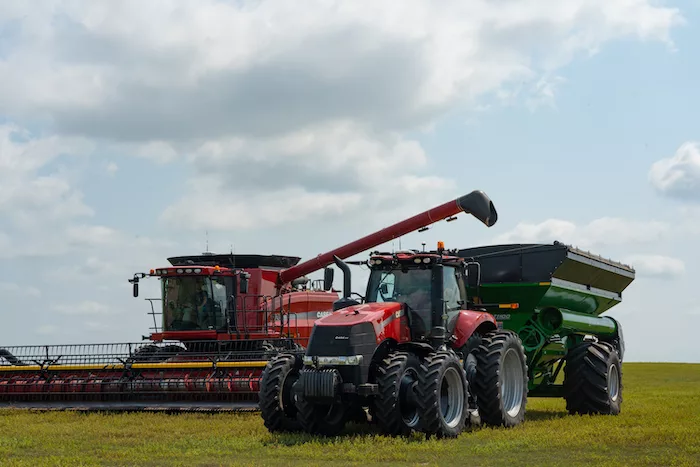Aaron Magenheim, founder of consulting firm Ag Tech Insight, estimates that his team talks to about 130 ag tech startups every month.
Magenheim told Successful Farming that the amount of technology isn’t lacking, but getting value out of it is.
“Today, I think we have everything we need for the next five to 10 years, but technology only works as well as the people using it,” Magenheim says. “As an industry, we don’t know how to use many of these technologies to actually get real value out of them.”
Magenheim talked with writer Laurie Bedord about the top 3 agtech investment trends he identified in 2021 and what’s ahead for 2022, including 8 ag tech startups on his radar.
Trend #1: Autonomous Farming
Labor shortages are a widespread problem in agriculture. In 2021, investors and ag tech companies funded startups focused on automation, a potential solution to labor challenges.Venture capital firm AgFunder reports 2021 agrifood tech investments are on pace to break a new record, with $24 billion raised globally in the first half of the year. That's close to the total for all of 2020, which broke records with $30 billion in funding.
Some of the deals that made headlines in 2021 included Deere & Company’s acquisitions of Bear Flag Robotics and AgriSync, CNH Industrial’s purchase of Raven Industries and exclusive licensing agreement with Monarch Tractors, and Kubota’s acquisition of AgJunction.
Although all are notable deals, Magenheim believes the most significant acquisition of 2021 was Bushel’s purchase of GrainBridge, a startup created by Cargill and ADM. According to Bushel, the acquisition created a network for more than 40% of the grain origination in the U.S. and Canada, which translates to 10 billion bushels annually.
“The fact that they are willing to release ownership to Bushel will be a game changer for the grain supply chain,” he says. “From an industry and adoption acceptance standpoint, it’s exciting because we haven’t seen anything like this before.”
Trend #2: Imagery Advancements
Imagery services became more than just “pretty pictures” in 2021, Magenheim says. Companies like Sentera and Ceres Imaging are developing tools that provide actionable analytics for precision agriculture images. The reasonable price point for such services make the barrier to entry low for growers.
Trend #3: Simplicity and Collaboration
Agtech startups focused on simplicity in 2021 with apps that collect information, and Magenheim says this is still a popular path to pursue. He’s keeping an eye on AgWorld, KipTraq and Conservis going forward. Conservis, acquired by Telus Agriculture and Rabobank in summer 2021, combines Telus’ technology with Rabobank’s knowledge across the food value chain, aggregating a farm’s data into a single resource.
Startups also increased collaboration among themselves, major ag companies and farmers.
“Companies are realizing they’re not going to be the platform that does everything, so they need to work together,” Magenheim says.
The connections are critical to developing products that are actually useful to farmers.
“Some are very impractical when we try to implement them on the farm,” says Nebraska farmer Brandon Hunnicutt. “Farmers need to be open to sharing what they need on their farms and what may or may not work. Companies need to be willing to ask for out input in the early stages of development.”
Shubhang Shankar of Syngenta Group Ventures agrees, advising companies to start by “not overpromising and underdelivering.”
What’s next in 2022?
Shankar believes innovation will move toward producing food sustainably, rather than cheaply, as initiatives and conversations about repairing the environment become increasingly important.
One of Magenheim’s five startups to watch, Arva Intelligence, does just that. It combines a farmer’s existing data with machine learning models to quantify the impact of their current practices. Arva partnered with Bluesource, a North American carbon offset developer, in April 2021. Bluesource is providing an integrated end-to-end solution for organizations implementing regenerative ag solutions to access carbon markets and finance, while Arva will provide Bluesource with a scalable, geospatial data platform to quantify grower carbon offsets and ecosystem service benefits.
“The company is taking a different stance on sequestering carbon that makes a whole lot of sense,” Magenheim says.
Magenheim’s other startups to watch in 2022 include Hectre, an orchard-management and fruit-sizing app; Ganaz, an app for recruiting, training, communicating and paying employees; Intelliculture, farm management software designed to address labor, pest prevention and machine safety issues; and SWARM Engineering, software for load planning in logistics, product blending, pricing and inventory demand plans.
Related Content
4 Trends that Will Shape Agriculture in 2022: AgWeb talks with a futurist and former naval intelligence officer about what he sees impacting agriculture in the new year.
Autonomy Popular Among Precision Farming Dealer Readers & Listeners in 2021: Autonomy is an evident theme in the list of top articles, blogs, podcasts and videos posted to the Precision Farming Dealer website in 2021.






